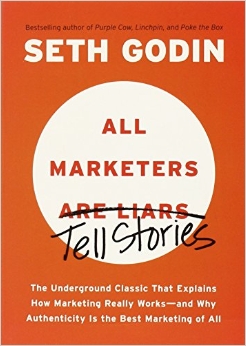A good story makes the product better
 Okay, this isn’t my own, it’s an excerpt from a new book called All Marketers Are Liars by Seth Goldin. The excerpt appeared in the May 2005 issue of Fortune: Small Business, so I’m not sure if it’s exactly what will appear in the final book (to be published this month). But, since it relates to my career, and I liked it, I’m just posting it. By the way, the rest of the excerpt is truly fascinating – look for the book in stores soon!
Okay, this isn’t my own, it’s an excerpt from a new book called All Marketers Are Liars by Seth Goldin. The excerpt appeared in the May 2005 issue of Fortune: Small Business, so I’m not sure if it’s exactly what will appear in the final book (to be published this month). But, since it relates to my career, and I liked it, I’m just posting it. By the way, the rest of the excerpt is truly fascinating – look for the book in stores soon!
Georg Riedel is a fibber—an honest spinner of tales. He tells his customers something that isn’t true—his wineglasses make wine taste better—and then the very act of believing it makes the statement true. Because drinkers believe the wine tastes better, it does taste better.
Georg is a tenth-generation glass blower, an artisan pursuing an age-old craft. I’m told he’s a very nice guy. And he’s very good at telling stories. His company makes wineglasses (also whiskey glasses, espresso glasses, and even water glasses). He and his staff fervently believe that there is a perfect (and different) shape for every beverage. According to Riedel’s website, “The delivery of a wine’s ‘message,’ its bouquet and taste, depends on the form of the glass. It is the responsibility of a glass to convey the wine’s messages in the best manner to the human senses.”
Thomas Matthews, the executive editor of Wine Spectator magazine, said, “Everybody who ventures into a Riedel tasting starts as a skeptic. I did.” The skepticism doesn’t last long. Robert Parker Jr., the king of wine reviewers, said, “The finest glasses for both technical and hedonistic purposes are those made by Riedel. The effect of these glasses on fine wine is profound. I cannot emphasize enough what a difference they make.” Parker and Matthews and hundreds of other wine luminaries are now believers (and as a result, they are Riedel’s best word-of-mouth marketers). Millions of wine drinkers around the world have been persuaded that a $200 bottle of Opus One (or a bottle of Two-Buck Chuck) tastes better when served in the proper Riedel glass.
Yet when tests are done scientifically—double-blind tests that eliminate any chance that the subject would know the shape of the glass—there is absolutely zero detectable difference among glasses. A $1 glass and a $20 glass deliver precisely the same impact on the wine: none.
So what’s going on? Why do wine experts insist that the wine tastes better in a Riedel glass at the same time that scientists can easily prove it doesn’t? The flaw in the experiment, as outlined by Daniel Zwerdling in Gourmet magazine, is that the reason the wine tastes better is that people believe it should. This makes sense, of course. Taste is subjective. Riedel sells millions of dollars’ worth of glasses every year. It sells glasses to intelligent, well-off wine lovers, who then proceed to enjoy their wine more than they did before. Marketing, in the form of an expensive glass and the story that goes with it, has more impact on the taste of wine than oak casks or fancy corks or the rain in June. Georg Riedel makes your wine taste better by telling you a story.